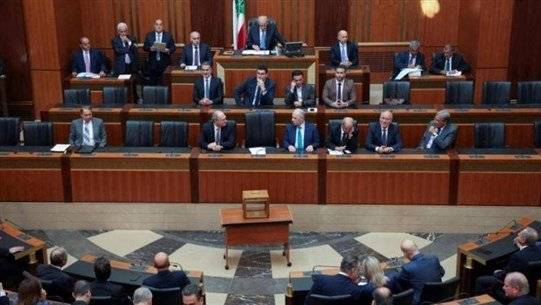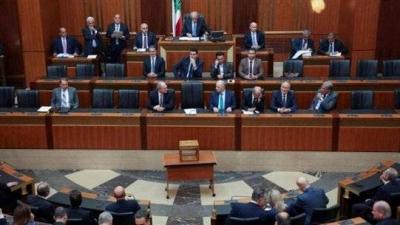Preparations are in full swing for the second electoral session set by the Speaker of the House Nabih Berri on October 13, coinciding with the anniversary of General Michel Aoun's removal from the Baabda Palace in 1990, in a new attempt to elect a new president to succeed President Michel Aoun. It is true that Berri ended the first session, which was more of a rehearsal to gauge the pulse and reveal cards, by indicating that consensus on the president's name would dictate the timing of the second session; however, he is ultimately compelled to adhere to constitutional requirements and call for the council to convene even if division prevails.
In reality, no significant new developments have occurred that would change the electoral landscape in its second round. It is likely that the proceedings of the session on October 13 will not differ from the previous one, whether in terms of the nominations being discussed and voted on or regarding the "scores" that will display numbers before the MPs as they await the counting of votes in the glass box.
specifically, data indicates that Michel Moawad remains the candidate for some wings of the opposition, while the "Forces" party is striving to gather as many votes as possible in favor of the deputy from Zgharta. They have held a series of meetings and gatherings with deputies from other blocs to convince them of this choice, but there are many obstacles preventing the alignment of the Sunni deputies and the "Group of 13 Reformists" with the bloc supporting Moawad's candidacy.
According to information, Saudi Arabia, which has re-entered the Lebanese file through the presidential entitlements within a U.S.-French-Saudi understanding expressed on several occasions, has not yet revealed its cards regarding Lebanon. For now, it is merely putting its list of conditions on the table, the foremost of which is to protect the "Taif Agreement" and, subsequently, to discuss the identity of the next Prime Minister.
Thus, observers confirm that Moawad's candidacies remain within the scope of local political dynamics; otherwise, Sunni deputies would have lined up behind him if a Saudi decision had been made determining the Kingdom's stance on the presidential entitlements. Conversely, they point out that the disagreements within the components of the "Group of 13" regarding Moawad's nomination are what prevent his adoption for the presidency, especially as any fracture within this bloc would expose it to fragmentation. Consequently, observers doubt that Moawad's candidacy will witness a fundamental change that could bring his tally close to sixty votes, making him a competitive candidate, especially since the Maronites of this bloc would be the first to confront such a scenario.
Conversely, the white ballot will again be the common factor among the components of the March 8 forces, awaiting serious confrontation rounds that may begin after the critical stop on October 31, with the entry of Army Commander Joseph Aoun into the ring as a potential candidate for opposition groups. This is in light of the supportive Western climate for his coming to power for several reasons, which could make him a local meeting point, in contrast to the nomination of the head of the "Maronite Movement" Suleiman Franjieh, who is more serious among several factions, especially since the nomination of the head of the "Free Patriotic Movement," Gibran Bassil, is encumbered by American sanctions.
According to supporters of the Zgharta axis, his nomination does not face substantial obstacles that could prevent him from continuing the journey, given the French push to complete the presidential entitlements as soon as possible. He himself announced that the Americans had not communicated any objections to him, nor had he received any negative positions from Saudi officials distancing him from the presidential race, which could be interpreted as no Saudi veto nor enthusiasm for his candidacy... at least for now.
At the local level, those enthusiastic about his option believe that the main components of his battle lie in the mutual relationship with "Hezbollah," which also prefers to reach an understanding on a president it trusts. This is his primary choice, as "centrality," from the perspective of the "Party," means "opposition," while Bkerke shows no objections to Franjieh's ascension. His candidacy could attract numerous parliamentary votes that remain hesitant to this day, especially from the Sunni environment. He is also a proponent of the "Taif Agreement" and is committed to it, making him a source of reassurance to Saudi Arabia.
However, in any case, the ascension of the head of the "Maronite Movement" to the palace requires passing through the obligatory corridor imposed by Gibran Bassil. The latter, who has not given up yet, could use all available cards that might return him as a candidate if international circumstances change in his favor. However, when the time comes, his choices might be limited to Joseph Aoun and Franjieh. At that time, he will have to weigh his decision based on his political future: who can he rely on to ensure his continuity? And how will he protect his base from rivals, particularly the "Forces"? It is likely that the balance may tip in favor of the head of the "Maronite Movement," especially since the army institution holds a respected position in the Christian mindset due to the factor of trust, and that could help rally some of this audience. This might be why some Western officials are leaning towards endorsing the Army Commander’s candidacy.




